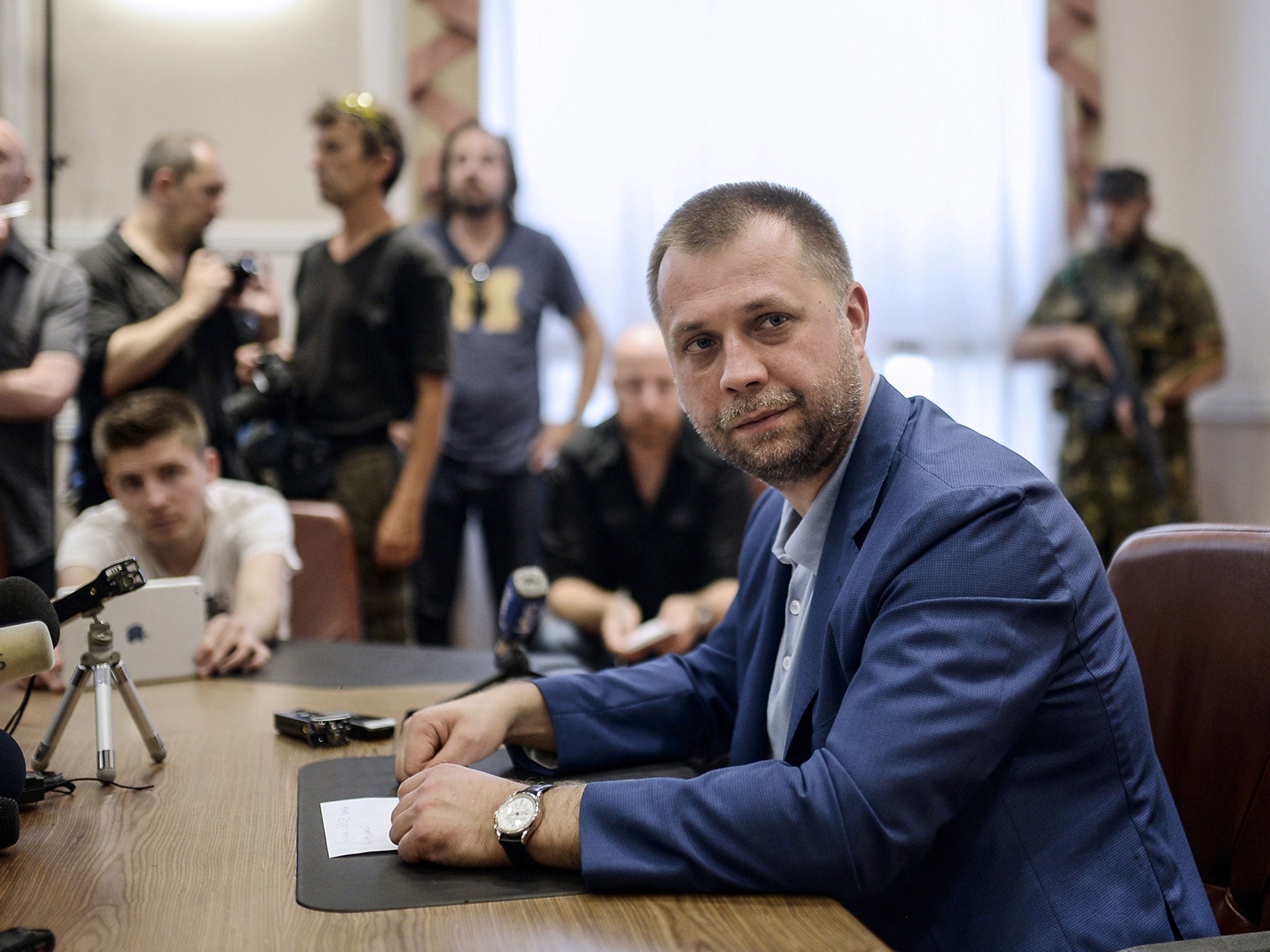Malaysia Airlines MH17 crash: An audience with Alexander Borodai the man whose fighters are accused of downing the plane

Alexander Borodai, the man who styles himself Prime Minister of the Donetsk People’s Republic, had set the time of his press conference for half-past noon.
By the time he reached the conference room, situated on the 11th and highest floor of the city administration building, he was 35 minutes late. So Mr Borodai, dressed in jeans, a grey T-shirt, a pale blue jacket and with his hair cropped close, quickly got down to business.
He was ready to cooperate with international experts and hand over the bodies from Flight MH17, he announced, though he would like some of those experts to be Russian. He could not hand over the bodies to the Ukrainians because the Ukrainians could not be trusted. And the media should not believe the accusation that he and his separatist fighters shot down the plane.
“We did not have the technical capability or the motive to shoot down this plane,” he declared, as two thick-set bodyguards looked on. “The enemy had all the technical ability and they had the clear motive to shoot it down.”
The 41-year-old Mr Borodai, who is originally from Russia, arrived in Donetsk in May when he was appointed head of the breakaway Donetsk People’s Republic (DPR) by its rag-tag parliament. The same month fighters loyal to him stormed the administration building in the city centre and booted out other separatists who had been occupying the grey premises for weeks.
There have been widespread allegations that Mr Borodai has long been close to the Kremlin. In 2002, the Russian Communist newspaper Pravda reported that Mr Borodai had been appointed deputy director of the FSB, the successor agency to the KGB, though he claimed that was nothing more than a prank to mark his 30 birthday.
What is known with certainty is that during the 1990s, Mr Borodai was one of a number of far-right Russians employed by the nationalist Zavtra newspaper, where he wrote many articles celebrating the glories of Russia’s past. He apparently supports the expansion of Russia’s borders to take in its former imperial territory.
While still supposedly a journalist, he was also involved in an uprising in Moldova, where a small enclave, Transnistria, was set aside for Moldova's Russian minority
Mr Borodai has also confirmed that earlier this year he was in Crimea, working as a strategic and security adviser to Sergey Aksyonov, the separatist Prime Minister of Crimea, which Russia annexed in April.
“He’s a fascinating individual, a key figure in the shadowy network of ultranationalist writers, businessmen, criminals, and army veterans that has existed on the fringes of Russia’s secret services since the early 1990s,” said Daniel Treisman, a Russia expert and Professor of Political Science at the University of California.
He added: “He’s certainly in close touch with the Kremlin. I would guess that he is coordinating with the political managers there very regularly, but he is also reacting to rapidly unfolding events and the volunteers and other troops under his command may sometimes have their own ideas.”
Precisely how Mr Borodai came to make his way to this part of eastern Ukraine is unclear. But he told journalists he had come at the invitation of Igor Girkin, better know as Igor Strelkov, the man who heads the armed forces of the Donetsk People’s Republic.
Mr Girkin, who is said to be an enthusiast of military reenactments, appears on a European Union sanctions list, where he is said to be on the staff of Russian military intelligence. He and Mr Borodai both once worked for Konstantin Malofeyev, a tycoon who reportedly funded much of the break-away activity in Crimea.
In recent days, a new infamy has engulfed Mr Girkin after he was allegedly spotted on social media boasting about shooting down what he thought was a AN-26 Ukrainian military transport plane at the same time Flight MH17 fell from the sky. The posting was subsequently deleted, but not before copies were made. “We warned you not to fly in our skies,” it said.
On Monday, Mr Borodai was asked about Mr Girkin’s alleged comments. He said he had spoken with the military commander but claimed that “this was not the subject of our discussions”.
Also watching the press conference was Vladimir Antufeyev, Mr Borodai’s supposed deputy. Reports say Mr Antufeyev, with a background in Russia’s intelligence world, previously served as head of security in the Russian-controlled territory of Transnistria. He was recently brought to Donetsk to try and end infighting.
Mr Borodai claimed he was ready to hand over the bodies to international experts and would help them if they came to Donetsk. He said he was ready to try and ensure their safety.
Yet he said the bodies would not be handed over to the Ukrainian authorities because they cold not be trusted. He claimed the authorities in Kiev were only interested in blackening the reputation of the DPR.
He said he would like to offer his condolences to the families of the 296 passengers and crew killed when Flight MH17 crashed, allegedly shot down his men or else Russian fighters operating alongside his team.
“Don’t listen to the news on social media, especially the social media from Ukraine,” he said. “It’s very hard to find the truth.”
Mr Borodai took questions for around 45 minutes and then called things to a halt. His two burly bodyguards stopped journalists pursuing him down the corridor. With that, the Prime Minister of the Donetsk People’s Republic was gone.
Join our commenting forum
Join thought-provoking conversations, follow other Independent readers and see their replies
0Comments